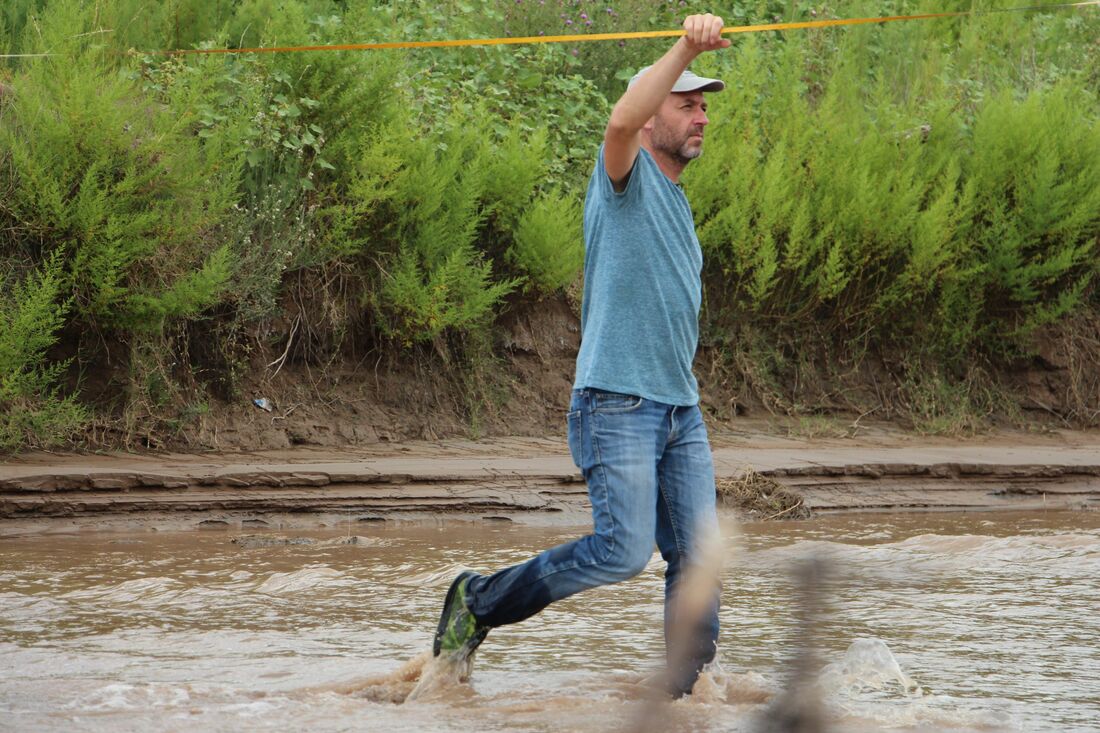(A very biased and, perhaps, emotional take on this) The notion of “Ecoydrology” in my mind points to the biota and the rules of the living world commanding the vagaries of water cycling on Earth. Probably, our world is much more biotic than what most Earth scientist still accept or grasp. For me Ecohydrology has its most exciting front in this realization and the one that comes automatically after it: By shaping the world´s biota, we, humans, are transforming the water cycle too.
What are your undergraduate and graduate degrees in?
Doubtful on whether I wanted to be a park ranger, a mountain guide or a field biologist I decided to study Agronomy in Universidad de Buenos Aires in my home city. I graduated in 1993 and I am still proud of being and Aggie and a lot of my current research involves crops, farms and farmers. In 2002 I obtained my PhD in Biology from Duke University in the US, under Rob Jackson´s advice. My dissertation explored how plants redistributed nutrients vertically. Duke and Rob´s lab where like home for many years since then.
How did you arrive at working in/thinking about ecohydrology?
Like the most important things in life, almost by chance. I was working with soil nutrients in the plains of Argentina, specifically using islands of tree plantations within the grasslands to explore nutrient uplift by plants. I started realizing that groundwater was a very important part of the system and I needed to understand its role exchanging materials (nutrients/salts) with plants and soils from below. Pulling from that thread I discovered the amazing “beast” that shallow water tables in the plains can be. They are the hub of many processes and they are present not just in a few rare spots like lowlands or riparian areas, but almost everywhere. They are also a powerful connector among landscape patches and a tremendous source of hydrological and ecological inertia. That thread took me directly into the world of vegetation-groundwater interactions and from there to land cover-atmosphere feedbacks, vegetation and flood dynamics, evaporation/transpiration and salt dynamics.
What do you see as an important emerging area of ecohydrology?
As the number one challenge and emerging area I would put Human-Water links. This is not about making our science useful to people (which off course is great!), it is about transforming it to understand how the behavior of humans and human organizations regarding water shape the water cycle. How do poor vs. rich or democratic vs. autocratic societies respond to wetting or drying climate trends (e.g. In a drying context, which ones would build more dams, become more water use efficient, or outsource water consuming activities?) Different responses will leave a different imprint on the water cycle locally and globally. Or let think about cultivated landscapes and how farming decision rules (e.g. to irrigation or not, to do paddy rice or dryland maize as agriculture expands to higher slopes in the tropics, to insist with soybean cultivation at the onset of floods or to switch to pastures instead) will translate into positive or negative hydrological feedbacks? I feel we know disproportionally more about the biophysical than the human controls of water fluxes on Earth, yet the Anthropocene is here asking for a change in our focus.
Do you have a favorite ecohydrology paper? Describe/explain.
I would mention Immanuel Noy Meir´s review in Annual Review of Ecology and Systematics in 1973, but Amilcare Porporato already mentioned it in his leaf not so long ago. So, I will bring instead a book that I consider revolutionary. It´s Bill Schlesinger “Biogeochemistry” Now in its 3rd edition, this book combines and extremely powerful synthesis of data with deep and ambitious underlaying plan which, in my opinion, is to show how we can approach the complexity of the Earth System and it’s response to the growing influence of humans from the perspective of the circulation of materials. In each chapter there is a very clever story highlighting the role of the biota and humans and their trends in Earth’s history. Many of the synthesis tables of the book could have been the core of top cited papers, but Bill opted to go for a more comprehensive and efficient way of making his point and reaching young scientists: A full book. This book transformed my thinking about our world. Interestingly the water chapter is not the strongest one, likely because at that time the understanding of the “bio” part of the water cycle was running behind what was known in the case of the carbon or phosphorus cycles. Still, the book is in the foundation of the careers of many ecohydrologists.
What do you do for fun (apart from ecohydrology)?
I like to swim. In the pool several days a week, in the ocean or the lakes when I can. I even swim sometimes to put sensors in the lakes of the Pampas. I also like hiking and running and enjoy cooking everyday food. I also get thrilled when I can become a part-time hunter-gatherer looking for nuts in abandoned homesteads in the sierra or fishing for dinner at the beach. Nature is the place I pick to work and play and sharing life with my two (grown) boys, my partner, my friends and family and the amazing team with whom we built the lab in San Luis, is the biggest joy.

 RSS Feed
RSS Feed